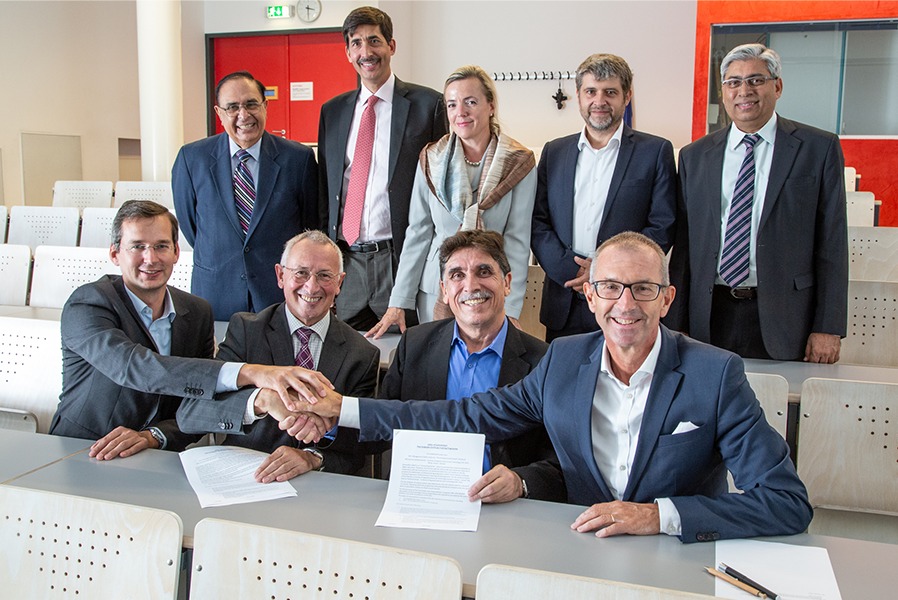Pak-Austria Fachhochschule: Institute of Applied Sciences and Technology is located in a rapidly changing and fiercely competitive global environment, Pakistan has to make bold strategic choices in order to achieve sustainable growth in the manufacturing sector.
The Pak-Austria Fachhochschule: Institute of Applied Sciences & Technology (PAF IAST) is our collaborative venture with select Austrian and Chinese Universities
In 2005, the then Chairman of the Higher Education Commission (HEC) in Pakistan, Prof. Dr. Atta-ur- Rahman, presented and got approved a Rs 250 billion Project to establish seven state of the arts Universities in collaboration with China, Italy, Austria, Sweden, France, and Germany. These Universities of Engineering, Science, Technology in Pakistan (UESTP) were to transform the Higher Education sector in Pakistan so as to enable the country to train its growing young population to become a part of the global technological revolution that was taking place. Despite signing of agreements and approval by the Government of Pakistan the Project was shelved in 2008.
However, a large body of young scholars had been sent abroad. Close to 300 PhD students were sent to Austria. Dr Atta Ur Rehman through his personal contacts enlisted the support of two very prominent academics in Austria. Prof. Michel Rode and Prof. Amin Tjoa. Both played a key role in developing the academic collaboration between the two countries. Prof. Michel Rode was eventually awarded the Sitara-i-Pakistan by the President of Pakistan for his outstanding contribution towards this cause.
Fortunately the dream was not lost. In 2007 the President of Austria conferred upon Prof. Atta-ur Rahman, the highest Civil award of Austria (“Grosse Goldene Ehrenzeischen am Bande”) . This happened to be a watershed moment for a ′fresh Start′ of his dream of establishing an Institution that had degree programs with practical skills embedded in its design. So that on graduation they could be easily absorbed by industry.
To this end, the services of Prof. Michael Rode, Prof. Amin Tjoa and Prof. Haroon Ahmed (University of Cambridge) were instrumental in preparing the “design framework” for this new project located in Haripur. The format or design followed was the one used for Fachhochschule in Austria, and it was further upgraded by incorporating that of Technical Universities with postgraduate research programmes with the involvement of China and Austria. The ′Fachhochschulen′ are the universities of applied sciences and had been running for over twenty-five years in Austria and were as such producing ready industry graduates. After several visits to a number of Fachhochschulen in Austria, agreement was reached for the formal collaboration. Similar visits were made to China and finally eight foreign universities agreed to partner in this initiative, three from Austria and five from China, making it the first university in the world with both a BS and MS programmes for the Fachhochschule portion and PhD and postdoctoral programmes in 5 Centers of Excellence in the Technical Engineering university portion. A dynamic Technology Park was also planned to be integrated within the university. A PC-I was developed and presented to the Government of Khyber Pakhtunkhwa, which was approved for Rs 08.6 billion on Jan 11, 2018.
On Jan 13, 2018, the Honorable Chief Minister Mr. Parvez Khattak laid the foundation stone of PAF-IAST.
In October, 2020, the Prime Mister of the Islamic Republic of Pakistan Mr. Imran Khan inaugurated the new campus and launched the first admission call in five disciplines.

We aim to raise the standards of technical education in Pakistan at par with those of most advanced industrial economies, notwithstanding the problems confronting developing nations in trying to achieve standards in advanced countries: standards that are constantly on the rise at a pace much faster than the economic capacity of a developing country. At the same time, we are fully conscious of and alive to the need of linking employment with education by harnessing high-quality manpower produced by such projects to induce, not only an inward flow of technology investment into Pakistan but also enable the generation of local hi-tech industry. The technology park integrated into the scheme of Pak-Austria Fachhochschuleis a cardinal feature of this holistic concept.
Fulfillment of this novel concept, however, will remain an elusive dream without creating a critical mass of high-quality engineers and a hi-tech industry base. The whole spectrum of hi-tech industrial base in the country, therefore, needs to grow fast to develop an industrial infrastructure capable of supporting the progress of a diverse array of growing industrial companies.
The Pak-Austria Fachhochschule: Institute of Applied Sciences and Technology boasts the latest teaching and practical laboratories equipped at par with partner universities. Effective plans are in hand to keep pace, through a process of monitoring by their accreditation bodies, with the highest standards of the curricula, teaching resources, and the learning outcomes adopted by the foreign partners. On completion of the initial establishment phase, the quality and output will be gauged, and programs accredited, using internationally-recognized criteria.
Honorable Prime Minister of Pakistan Mr. Imran Khan inaugurated the PAF-IAST on 17th September 2020, along with Governor and Chief Minister of Khyber Pakhtunkhwa.
“Prime Minister said on the occasion The Institute is one of the initiatives of the Government of Khyber Pakhtunkhwa which envisages creating highly credible technical education infrastructure both at tertiary and hi-tech industry levels.
Imran Khan said that Pakistan has capabilities to advance into a development phase by changing the way of thinking. It is the need of time for stepping forward in the eld of science and technology for opening a new era of development in Pakistan.
The premier urged for choosing a path to transform Pakistanis into a great nation and Allah Almighty will denitely give success to those honestly pursuing a target.
He thanked China and Austria for assisting the authorities in Pakistan as the establishment of the institute was an important project of the Khyber Pakhtunkhwa (KP) government